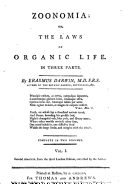The Beginnings of the Theory of Evolution
From thus meditating on the great similarity of the structure of the warm-blooded animals, and at the same time of the great changes they undergo both before and after their nativity; and by considering in how minute a portion of time many of the changes of animals above described have been produced; would it be too bold to imagine that, in the great length of time since the earth began to exist, perhaps millions of ages before the commencement of the history of mankind would it be too bold to imagine that all warm-blooded animals have arisen from one living filament, which THE GREAT FIRST CAUSE endued with animality, with the power of acquiring new parts, attended with new propensities, directed by irritations, sensations, volitions and associations, and thus possessing the faculty of continuing to improve by its own inherent activity, and of delivering down these improvements by generation to its posterity, world without end!
Notes:
Erasmus Darwin sees evolution, demonstrating the idea of evolution was prevalent at the time; Darwin simply figured out an algorithm for what made it happen.
Folksonomies: evolution biology natural selection
Taxonomies:
/science/biology (0.273959)
/science/social science/philosophy (0.203142)
/religion and spirituality/atheism and agnosticism (0.198103)
Keywords:
warm-blooded animals (0.956722 (neutral:0.000000)), new propensities (0.802653 (neutral:0.000000)), Erasmus Darwin (0.788205 (neutral:0.000000)), great similarity (0.787786 (neutral:0.000000)), inherent activity (0.783292 (neutral:0.000000)), great length (0.748226 (neutral:0.000000)), new parts (0.735876 (neutral:0.000000)), GREAT FIRST CAUSE (0.729869 (neutral:0.000000)), great changes (0.720057 (neutral:0.000000)), time (0.579713 (neutral:0.000000)), animality (0.461870 (neutral:0.000000)), irritations (0.453031 (neutral:0.000000)), volitions (0.452689 (neutral:0.000000)), evolution (0.440227 (neutral:0.000000)), /p (0.439811 (neutral:0.000000)), commencement (0.433960 (neutral:0.000000)), sensations (0.430947 (neutral:0.000000)), posterity (0.426892 (neutral:0.000000)), nativity (0.421833 (neutral:0.000000)), mankind (0.415351 (neutral:0.000000)), millions (0.412740 (neutral:0.000000)), portion (0.407934 (neutral:0.000000)), improvements (0.402655 (neutral:0.000000)), filament (0.395024 (neutral:0.000000)), structure (0.391052 (neutral:0.000000)), algorithm (0.388700 (neutral:0.000000)), earth (0.388046 (neutral:0.000000)), idea (0.387716 (neutral:0.000000)), ages (0.387664 (neutral:0.000000)), history (0.387378 (neutral:0.000000))
Entities:
Erasmus Darwin:Person (0.880795 (neutral:0.000000)), animality:Person (0.684628 (positive:0.416097))
Concepts:
English-language films (0.953219): dbpedia
Earth (0.753885): dbpedia | freebase
American films (0.689303): dbpedia
Evolution (0.668973): dbpedia | freebase | opencyc
The Faculty (0.652440): dbpedia | freebase | yago
Ashoka the Great (0.617051): dbpedia | yago
Ontology (0.538903): dbpedia | freebase | opencyc
World (0.519772): dbpedia | ciaFactbook | freebase





